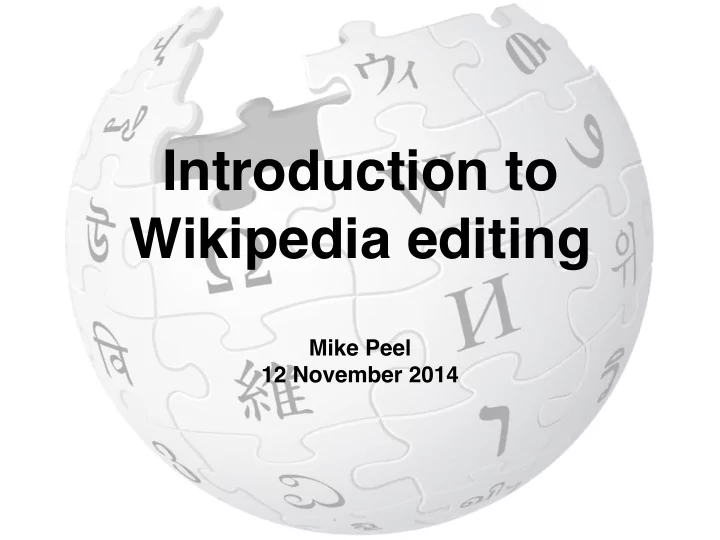

Introduction to Wikipedia editing Mike Peel 12 November 2014
Questions • Who has used Wikipedia? • … for their schoolwork? • … for their own interests? • Who has referenced a Wikipedia article? • Who has edited Wikipedia before? • What have you edited?
Wikimedia’s reach ~500 million visitors requesting ~20 billion pages / month 5th largest web property Over 31 million Wikipedia articles (all languages) 21.6 million freely licensed media files ~8,000 new Wikipedia articles each day ~9 million edits each month 14,800 new editors each month, 75,000 active registered editors total (5+ edits/month), 11,505 very active registered editors (100+ /month)
Five pillars • Wikipedia is an encyclopaedia. • Wikipedia is written from a neutral point of view. • Wikipedia is free content that anyone can use, edit and distribute. • Editors should treat each other with respect and civility. • Wikipedia has no firm rules. WP:5
Neutral point of view • Articles should represent “fairly, proportionately, and, as far as possible, without bias, all of the significant views that have been published by reliable sources on a topic.” WP:NPOV
Notability • “Wikipedia articles cover notable topics—those that have gained sufficiently significant attention by the world at large and over a period of time, and are not outside the scope of Wikipedia. We consider evidence from reliable independent sources to gauge this attention. The notability guideline does not determine the content of articles, but only whether the topic should have its own article.” WP:NOTE
No original research • Wikipedia articles must not contain original research. Includes: • Adding a fact or opinion that you can’t reference. • Synthesising information to reach a conclusion not supported by references. WP:NOR
Verifiability • All information on Wikipedia should be verifiable. • If something isn’t referenced on Wikipedia, anyone can challenge it and remove it. • Reliable sources need to be used to support facts and opinions. • What counts as a reliable source? What doesn’t? WP:V
Conflicts of interest • “when advancing outside interests is more important to an editor than advancing the aims of Wikipedia, that editor stands in a conflict of interest” • Paid contributions without disclosure are against Wikipedia’s T&C. • Always note your affiliation on your user page if it’s related to your editing activities. WP:COI
Using Wikipedia for schoolwork • Don’t copy the text of the article into your own work! Instead, use it as a summary of the topic to get you started with learning about the topic. • Use your judgement about whether the information in the article is accurate/trustworthy or not. • Check the sources! If you use referenced information from Wikipedia, then reference the sources rather than Wikipedia. WP:FAQ/Schools
Wikitext • Wikipedia articles are written in “wikitext”. Examples: • == Header == • ''Italic'', ‘’'Bold''', '''''Bold italic''''' • [[Link]], [http://example.com/ External link] • <ref name=“reference”>{{cite web | url=http:// example.com/ | title=Example}}</ref> WP:CHEAT
First steps
First steps
First steps
First steps
First steps
First steps • Identify an article you want to work on. (Doesn’t have to be in English!) • Look through it to see what could be improved. Or find some new information that can be added to the article. • Read through the discussion page to see if there’s a discussion related to the change you want to make. • Click ‘Edit’ and have a go at making your change. Then click ‘show preview’ to see if it’s worked!
Recommend
More recommend